Dual transition to help firms of all sizes
At VIR’s Sustainable Development 2024 Conference held in Hanoi last week, Le Thi Hoai Thuong, senior corporate affairs manager of Nestlé Vietnam, highlighted that the dual transition is not a luxury but a practical matter of investment, resource optimisation, and efficiency.
Nestlé Vietnam has been proactive in its green transition journey. Since 2010, the company has collaborated with Vietnamese farmers to adopt responsible sourcing and sustainable procurement practices. This long-term approach ensures the stable supply of high-quality materials that meet environmental and emissions standards.
“Our high-quality coffee products, sourced from Vietnamese farmers, are created for both domestic markets and exports, particularly to Europe. Anticipating stricter sustainability regulations, we began preparing more than a decade ago to avoid disruptions to our supply chain,” Thuong said.
Nestlé Vietnam has also embraced digital transformation to enhance its operations. Farmers now use the Farmer’s Diary application to manage their coffee farms more efficiently, recording daily expenditures, inputs, and outputs.
This digital tool improves traceability, ensuring that Vietnamese coffee beans meet deforestation-free criteria. This is essential for entering demanding export markets like the EU, where traceability and emissions calculations are critical.
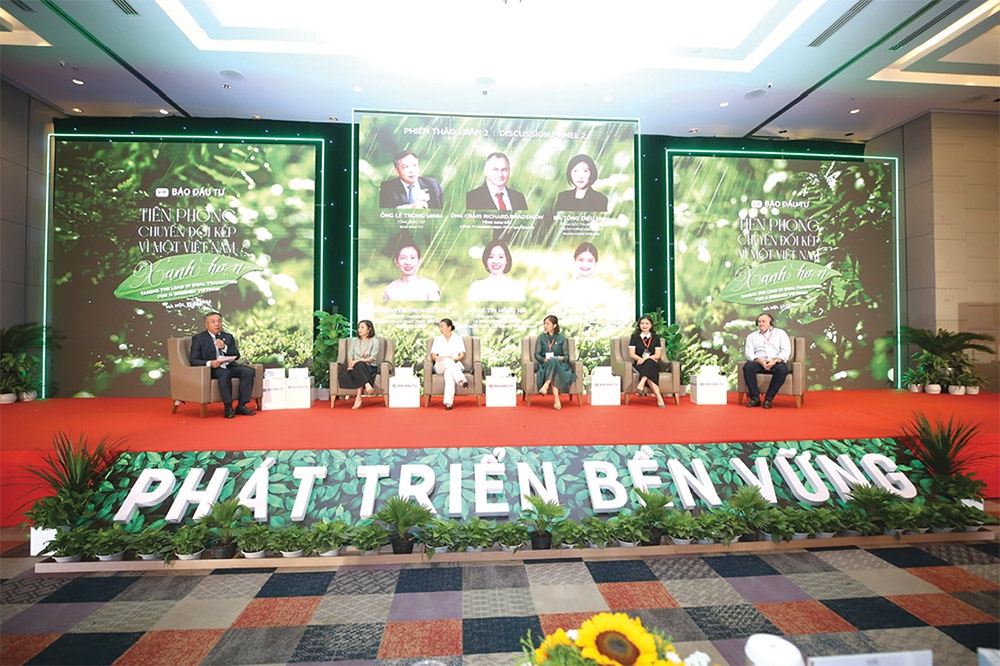 |
| Dual transition to help firms of all sizes, photo Duc Thanh |
Mitigating climate change
Phuc Khang Corporation has similarly committed to sustainable development, focusing on creating urban spaces that align with global environmental standards. The company integrates green building principles into its projects, ranging from standalone developments to high-rise and low-rise buildings. However, the journey has not been without challenges. In the initial stages, the company faced hurdles related to personnel, technology, financial resources, and policies.
Le Thi Hong Na, strategic director on sustainable development at Phuc Khang Corporation, said, “We remain steadfast in adopting and refining green building standards. By learning from both local and international best practices, we aim to develop urban areas that benefit both customers and the environment.”
Na explained that green buildings contribute to mitigating climate change through efficient use of energy, water, and resources, while also improving the health and wellbeing of residents. To overcome financial obstacles, the company has optimised resources, reduced operational costs, and strengthened partnerships with financial institutions.
While large corporations are equipped to pursue dual transitions, small and medium-sized enterprises (SMEs) face significant barriers, particularly in accessing the necessary capital.
The United Nations Development Programme (UNDP) has been supporting circular economy initiatives and social impact businesses in Vietnam. Do Le Thu Ngoc, head of the Inclusive Growth Department at the UNDP in Vietnam, noted a significant gap between large corporations and SMEs in adopting digital transformation. Most SMEs focus on boosting e-commerce sales but lack support for transitioning to omnichannel business models.
“The biggest hurdle for SMEs is accessing secure financial resources,” Ngoc said. “Many lack the necessary collateral to secure loans from commercial banks, especially if they do not engage in innovative business activities, which are seen as higher-risk. Financial tools such as bonds and carbon credits could provide alternative solutions for funding dual transitions.”
Ngoc also pointed out that while large corporations are adapting quickly to global green and digital trends, most SMEs are still in the awareness phase. Given that a majority of Vietnamese businesses are SMEs or women-owned, Vietnam must ensure their inclusion in the transition.
A strong transition
According to Tong Dieu Linh, head of Transaction Banking Center, Financial Market and Transaction Banking Division at VPBank, SMEs face limitations in resources, management expertise, and knowledge of green and digital transitions. VPBank has responded by offering green financing options as well as technical training and consulting services to SMEs.
“A sustainable development policy must be embedded from top management to all employees to ensure organisation-wide commitment,” Linh said.
VPBank has long been committed to fostering green initiatives. In collaboration with the International Finance Corporation (IFC), a member of the World Bank Group, VPBank has raised over $2 billion in green credit since 2020. This funding supports firms pursuing sustainable practices while ensuring the bank’s governance and measurement frameworks meet international standards.
“This journey is challenging, requiring robust internal mechanisms to channel green finance effectively while adhering to international requirements,” Linh added.
Nguyen Dinh Tho, general director of the Institute of Strategy and Policy on Natural Resources and Environment under the Ministry of Natural Resources and Environment, highlighted Vietnam’s achievements in green economic development. Vietnam ranks in the global top 50 for green economy performance, top 75 for green infrastructure, and top 25 for green reform and growth.
Despite this, challenges remain in policy implementation and green infrastructure development.
“We are lagging in policy frameworks and impact assessments,” Tho said. “While the government has been cautious in implementing policies to allow foreign investors to survey renewable energy opportunities, the global market is moving rapidly. For example, the UK’s feed-in tariffs for wind power have fallen from 9 to 3 US cents per kilowatt-hour, while Vietnam’s rates remain at 7-9 US cents.”
Tho emphasised the need for faster policy implementation to stay competitive. “If we act too slowly, Vietnam will fall behind global trends, missing opportunities to lower tariffs and attract more investment,” Tho said.
| To Quoc Hung, country manager, ACCA Vietnam
In our interactions with business leaders, ACCA has found that they possess a deep understanding of their organisations. What they seek, however, is an approach that is both comprehensive and practical. To meet this need, we focus on delivering solutions that combine these elements seamlessly. ACCA is conducting scientific research on the adoption of sustainable strategies and their impact on long-term business outcomes. By analysing around 10 years of data from various companies, we aim to provide insights that help business leaders see the bigger picture. Based on these findings, we will offer practical advisory solutions to support the integration of international standards into sustainability reporting. Additionally, ACCA plans to introduce advisory approaches to help businesses quickly adopt international standards for sustainability reporting. This will also enable them to access green finance opportunities and meet trade requirements with countries prioritising green finance. I am confident that these two approaches will help business leaders quickly grasp the key elements of the green transition in the near future. Craig Richard Bradshaw, CEO, Masan High-Tech Materials
Transitioning to a circular economy presents both opportunities and challenges as we support the global shift towards sustainable technologies. Materials such as tungsten, fluoride, and copper are essential for green technologies, powering electric vehicle batteries, wind turbines, solar panels, and semiconductors. However, intense competition from China, where companies benefit from substantial government support, poses significant challenges to global competitiveness. Despite this, our Vietnamese-made products are often favoured by customers seeking alternatives to Chinese sources. A major challenge is scaling up recycling capabilities. While we have developed advanced technology to recycle scrap into valuable products domestically, delays in government approvals have slowed our progress in building recycling facilities. Although Vietnamese regulators have shown greater engagement recently, faster decision-making is crucial to prevent recycling initiatives from relocating to neighbouring countries such as Cambodia, Laos, or Malaysia. Vietnam has ambitious circular economy goals, but current legislation does not fully support foreign investment in recycling infrastructure. With recent improvements in government stability, we are optimistic about accelerated regulatory processes that will enable effective circular solutions. However, to fully realise Vietnam’s green economy vision, it is essential to address policy gaps at both national and local levels. Clear and actionable policies are critical for us and other businesses to confidently invest, expand infrastructure, and contribute meaningfully to the country’s sustainable development goals. Chaturon Thipphiansak, deputy general director SCG Vietnam
We have developed cooperation and sustainable culture by incubating environmental, social, and governance (ESG) principles in all aspects of our operation. We actively develop our human resources with a focus on three areas. Firstly, we regularly organise the training and build awareness for our employees, improve the community. Secondly, we focus on the employee-driven initiatives. We encourage our employees to come up with their initiatives, such as designing the products based on ESG principles. Thirdly, we focus on the measurement and the reporting because it helps maintain the principles in our organisation. Thus, we keep monitoring and reporting the results for our initiatives. Other companies may consider applying these initiatives to make their businesses sustainable. SCG signed an MoU with the Ministry of Natural Resources and Environment to establish a circular economy forum in Vietnam. This forum will discuss sustainable development in the country. We also look at the industrial partnership because we cannot build all the supply chain by ourselves. The key is about the industrial partnership, including our stakeholders, suppliers, vendors, service providers, and then our customers as well. We also collaborate with all the stakeholders in our industry to build the green supply chain in the market. On top of all that, we focus on green technology applied to our processes and products. This can sustain the long-term development in terms of the product. One challenge is the mindsets of people and relevant stakeholders. We should build a green mindset for our staff, the community, and customers in our industry. The next step is to develop the process to produce green products. For example, SCG has produced low-carbon cement, which can reduce the carbon emissions by 20 per cent.. We will focus on green products that can be recycled, and be environmentally friendly. Le Hoai Thuong, senior corporate affairs manager Nestlé Vietnam
Dual transition is not a passing trend, but a long-term commitment embedded in the strategic priorities of leading companies. Nestlé Vietnam stands out as a pioneer in green and digital transformation, proving that a sustainable approach is not only essential for overcoming challenges, but also for thriving in an increasingly demanding international market Nestlé Vietnam began laying the groundwork for its sustainability efforts in 2010-2011 when it committed to responsible sourcing coffee from local farmers. At that time, the concept of green transformation was not as widely recognised, but we saw the potential and importance of sustainable sourcing. For a major food company like Nestlé, sourcing raw materials, particularly agricultural products, is a cornerstone of its operations. This is true not only for domestic production but also for meeting the demands of global markets, such as Europe. By establishing sustainable sourcing standards early on, we have mitigated risks arising from increasingly stringent international regulations on emissions and traceability. This foresight helps ensure the company’s ongoing success and strengthens its supply chain. Recognising the critical role farmers play, Nestlé has also partnered with them to transition towards more sustainable and environmentally friendly farming practices. The group has embraced digital tools to support farmers in managing their finances more efficiently. Nestlé has introduced a ‘farm diary’ app, enabling farmers to record income and expenses, optimise their profits, and increase transparency in operations. By focusing on sustainable sourcing, supporting farmers, and collaborating with suppliers, the company has built a solid foundation for sustainable growth and success in the international market. This initiative encourages farmers to adopt sustainable practices that benefit both the environment and their livelihoods. These efforts not only help Nestlé meet its sustainable development goals but also position the company as a leader in environmental responsibility, ready to meet the growing demands of the global market. Le Minh Trang, associate director, Retail Measurement Services, NielsenIQ
Green consumption in Vietnam is advancing positively as sustainability becomes a growing concern among consumers focused on the future. This shift is visible not only in shopping behaviours but also in long-term priorities surrounding the environment. According to our Consumer Outlook and Expectation 2024 report, 16 per cent of Vietnamese consumers have made future sustainability as a key factor in their lifestyle and consumption choices, and 24 per cent are prioritising sustainable living in their short-term plans, underscoring the rising influence of eco-consciousness. Beyond environmental issues, 82 per cent of Vietnamese consumers are focused on enhancing physical health and wellbeing, indicating an increasing preference for products and services that support personal wellness and positively impact the environment. Consumers are now moving beyond individual concerns to address community-wide issues, recognising the value of sustainability and social responsibility. This evolution creates a significant opportunity for businesses to meet rising demands for eco-friendly products. To retain consumer loyalty, companies not only need to ensure quality but also actively demonstrate their commitment to environmental protection. Many major brands are shifting their business models towards sustainability, adopting measures such as recycled packaging, reducing carbon emissions, and conserving water. These strategies have provided significant benefits for companies, especially as consumers increasingly prioritise sustainable consumption. Additionally, transitioning to green production enables companies to reduce long-term costs by optimising energy and material use and minimising waste, thereby improving profit margins. Furthermore, companies benefit from enhanced brand image and a competitive advantage in the market. Lastly, adhering to international and national environmental standards opens up new export and business collaboration opportunities for companies. Nguyen Thi Ngoc Hue, gneral manager Corporate Communications AEON Vietnam
According to a statistical analysis, the number of transactions on major e-commerce platforms is high, but the actual value of purchases remains modest. For high-value products such as electronics or health and beauty care items, AEON Vietnam has a competitive advantage due to its extensive offline stores, customer support system, and excellent after-sales policies. We are also aiming to support customers in purchasing fresh and convenient products with the best quality through the development of online shopping applications such as websites and apps. AEON is also enhancing the integration of payments through an app where customers earn reward points when shopping at AEON Vietnam supermarkets and stores. These points can be used at all stores within the AEON ecosystem and our partners, creating additional opportunities and strengthening AEON’s competitiveness against other retailers and e-commerce platforms. As a service-oriented enterprise with around 6,000 employees, including full-time and part-time staff, AEON Vietnam places special emphasis on enhancing awareness and training for its employees. We have implemented a policy to support over 50 per cent of tuition fees for all employees and encourage them to propose innovative ideas to contribute to community and social activities. The talent development policy and training programmes are considered the greatest benefits of working at AEON. The company has been implementing various forms of coaching activities to help all employees easily access and understand the coaching culture, enabling them to apply it to their daily work in an effective manner. We also offer a policy to sponsor half of tuition fees for external training courses for employees and focus on enhancing the quality of specialised training courses for the retail industry, not only through domestic programmes but also through study and work programmes in Japan. To provide opportunities for employees to contribute to the sustainable development of the community, AEON has encouraged employees to participate in activities promoting sustainability. Chung Dieu Tuan, CEO CME Solar Investment
With a skilled technical team, we ensure the stability and reliability of its systems, consistently advancing technology to maximise efficiency and quality. This approach enables businesses to significantly reduce energy costs while meeting sustainable development goals and carbon reduction commitments. We collaborate with both foreign-invested enterprises and Vietnamese companies to install solar power systems on factory and business facility rooftops. By managing the investment, installation, and operation, we enable swift project deployment that meets renewable energy needs. These solutions deliver substantial energy savings while advancing the sustainability objectives of our clients. Adhering to international standards and Vietnam’s technical and environmental, social, and governance requirements, we have partnered with global corporations such as Saint-Gobain, CJ Foods, LG Innotek, Song Hong Garment, AEON Mall, and Foxconn. |
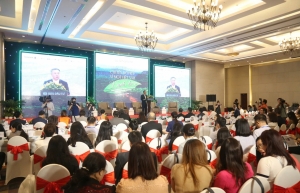 | VIR sustainable development conference opens in Hanoi VIR’s annual sustainable development conference, themed “Taking the Lead in Dual Transition for a Greener Vietnam,” opened at the Pullman Hanoi Hotel on November 12. The event brings together key stakeholders to explore innovative solutions for achieving Vietnam's dual transition of green and digital transformation. |
 | Vietnam on the verge of green industrial revolution At the first panel of VIR's sustainable development conference, experts highlighted the pressure facing Vietnam as the country enters a green industrial revolution. |
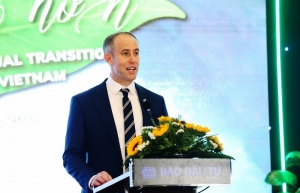 | New Zealand shares sustainable development experience with Vietnam With its commitment to environmental preservation reflected in both policy and practice, New Zealand hopes its experiences can provide guidance for Vietnam's shift to a greener economy. |
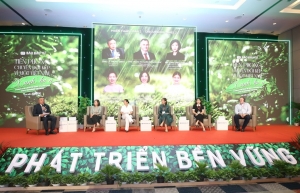 | Green-digital transition must start with proper mindset Firms are emphasising that effectively implementing green-digital transition strategies depends on understanding the core issues and priorities of the company, rather than merely following current trends. |
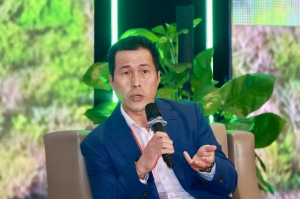 | Dual transition strategy to drive sustainable socioeconomic development At a sustainable development conference organised by VIR on November 12, Truong Bui, partner and general director of Roland Berger Vietnam, a prominent management consulting firm, offered valuable insights on the impact of the dual green-digital transition for businesses. |
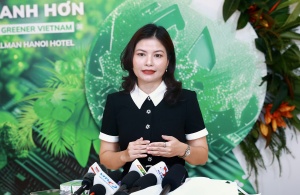 | Nestlé Vietnam leads green and digital transformation journey As the importance of sustainable development continues to grow, businesses are no longer viewing the 'green' trend as merely a competitive edge but as a crucial aspect of their investment strategies, according to Nestlé Vietnam. |
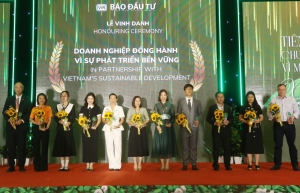 | 45 enterprises honoured for sustainable development contributions At the annual conference on sustainable development "Taking the lead in dual transition for a greener Vietnam" on November 12, a total of 45 enterprises in partnership with VIR were honoured for sustainable development in Vietnam. |
What the stars mean:
★ Poor ★ ★ Promising ★★★ Good ★★★★ Very good ★★★★★ Exceptional
Related Contents
Latest News
More News
- Trung Nam-Sideros River consortium wins bid for LNG venture (January 30, 2026 | 11:16)
- Vietnam moves towards market-based fuel management with E10 rollout (January 30, 2026 | 11:10)
- Envision Energy, REE Group partner on 128MW wind projects (January 30, 2026 | 10:58)
- Vingroup consults on carbon credits for electric vehicle charging network (January 28, 2026 | 11:04)
- Bac Ai Pumped Storage Hydropower Plant to enter peak construction phase (January 27, 2026 | 08:00)
- ASEAN could scale up sustainable aviation fuel by 2050 (January 24, 2026 | 10:19)
- 64,000 hectares of sea allocated for offshore wind surveys (January 22, 2026 | 20:23)
- EVN secures financing for Quang Trach II LNG power plant (January 17, 2026 | 15:55)
- PC1 teams up with DENZAI on regional wind projects (January 16, 2026 | 21:18)
- Innovation and ESG practices drive green transition in the digital era (January 16, 2026 | 16:51)








 Tag:
Tag:



















 Mobile Version
Mobile Version